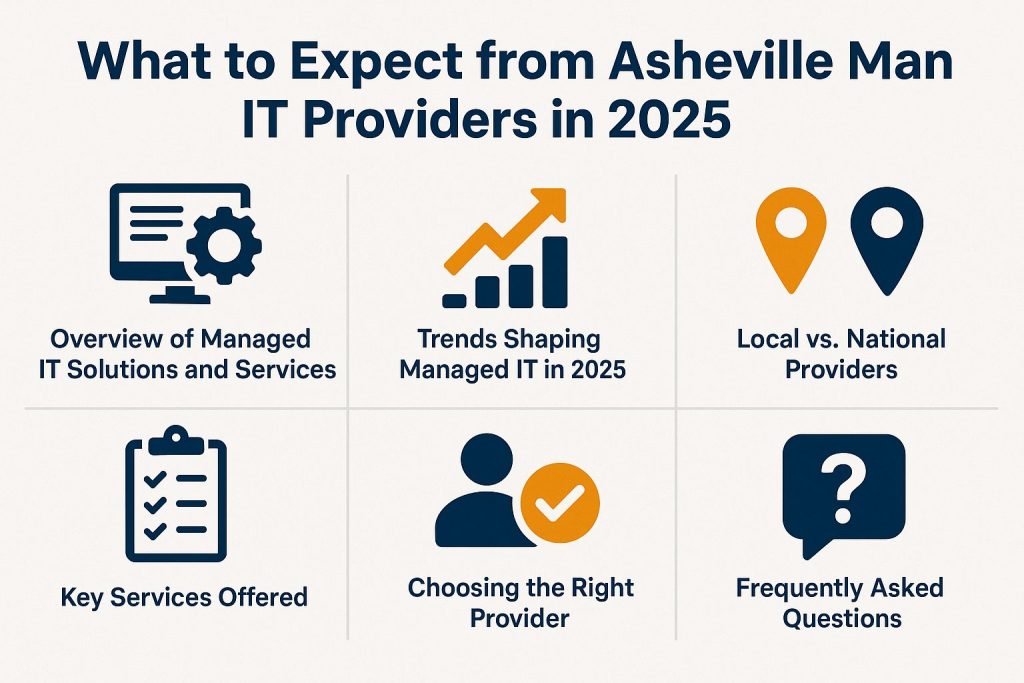IT Compliance: What Regulated Industries Must Know in 2025
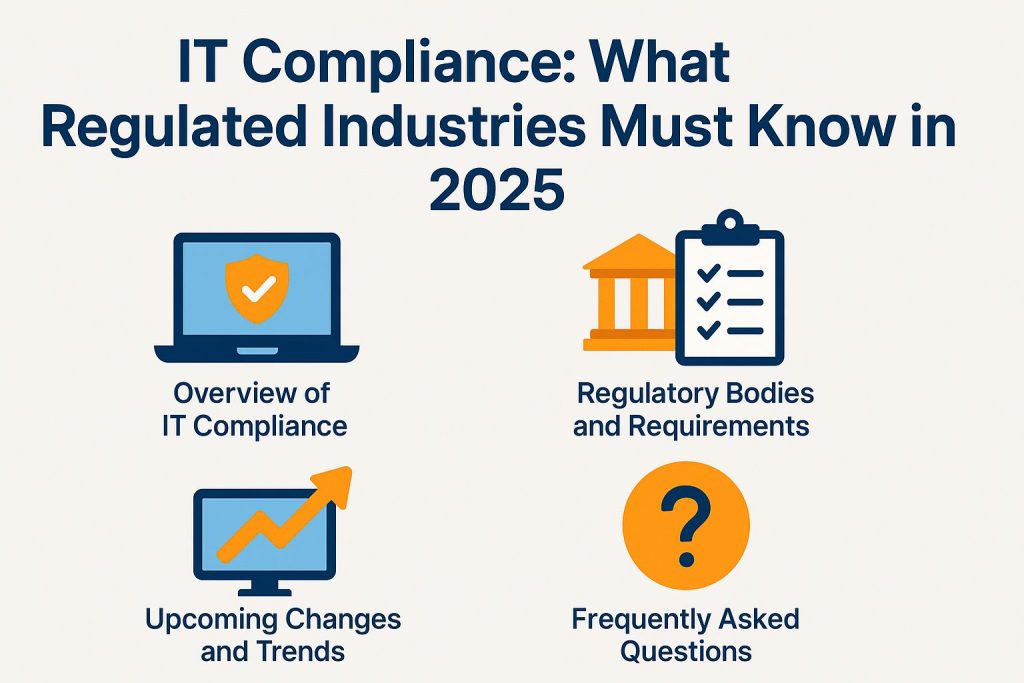
In a digital world, IT compliance is crucial for businesses in regulated industries. Understanding its definition and significance is important. It affects IT governance, risk management, and audits. It can mean success or costly penalties. This article covers IT compliance essentials. It will discuss regulatory bodies and best practices. This article clarifies this vital topic and its challenges.
Overview of IT Compliance
IT compliance means following regulations, standards, and frameworks for information security, data protection, and privacy.
In industries like healthcare, finance, telecommunications, and energy, organizations must follow strong compliance measures. They need to meet requirements set by HIPAA, GDPR, PCI DSS, and NIST.
IT compliance is complex. It includes various frameworks and technologies. Organizations must protect sensitive data and reduce risk of data breaches.
Effective governance, risk management, and compliance (GRC) strategies are essential. They include audits and risk management. These help organizations stay resilient and protect their reputation. For an extensive analysis of this trend, our comprehensive study on how managed security services protect digital assets examines effective methods to safeguard sensitive information.
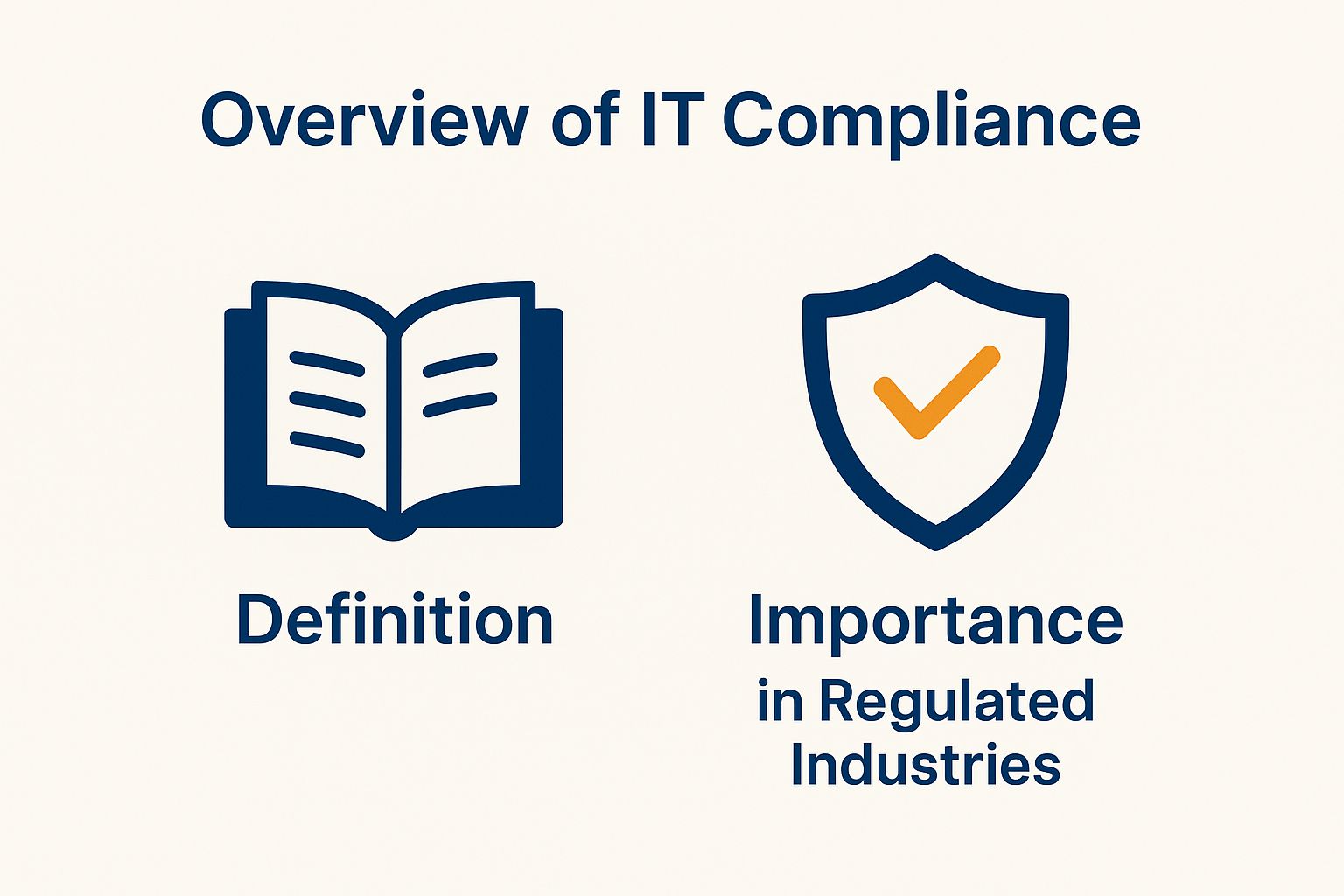
Definition and Importance in Regulated Industries
IT compliance is the process of following legal, regulatory, and policy requirements for information security and data protection. This is especially important in healthcare, finance, and telecommunications.
In these sectors, compliance is not just a checkbox. It is a vital strategy to manage risks from data breaches, reporting, and penalties.
By following regulations like HIPAA for healthcare and GDPR for personal data, companies protect information, build credibility, maintain trust, and meet obligations.
IT compliance initiatives provide a structured approach to data governance. This helps reduce vulnerabilities that can lead to financial losses, legal issues, and reputational harm. This proactive approach fulfills regulatory obligations. It also helps organizations improve efficiency and compliance.
Regulatory Bodies and Requirements
Regulatory bodies establish and enforce compliance requirements across multiple industries. This includes financial services, healthcare, telecommunications, and construction.
Organizations like the European Union, which oversees GDPR, and HIPAA in the United States create regulations that set compliance standards for data protection, privacy, and cybersecurity.
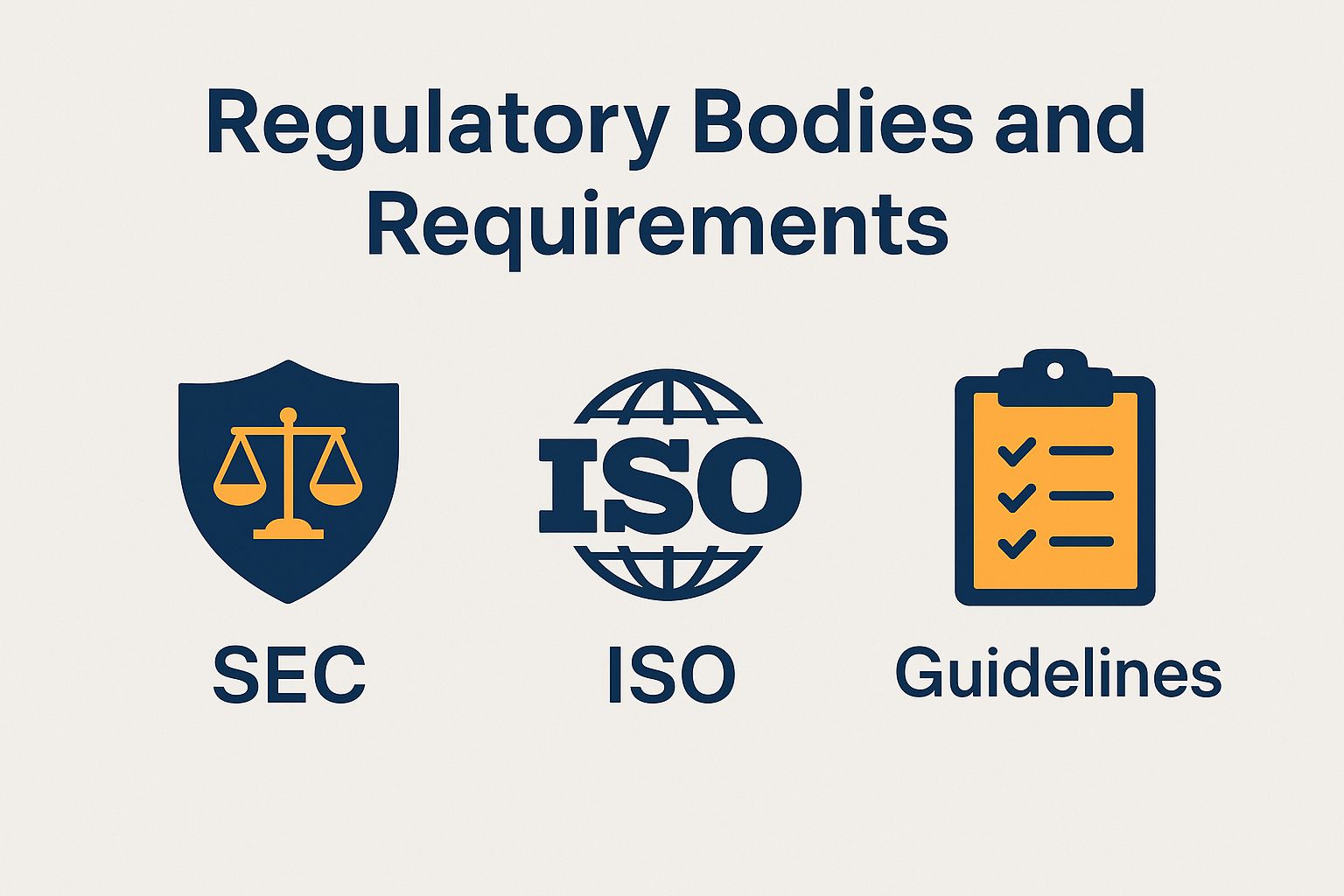
Key Organizations and Their Guidelines
Organizations like the International Organization for Standardization (ISO), the Sarbanes-Oxley Act (SOX), and national data protection authorities provide essential compliance guidelines. Organizations must follow these to meet industry regulations.
These guidelines shape compliance practices. They set clear standards for compliance metrics, incident response, audits, and risk assessments.
Organizations must implement systematic strategies to manage risk. These frameworks promote proactive measures. They help prevent breaches, ensure legal compliance, and improve security.
Following these guidelines ensures legal compliance. It also engages stakeholders by showing commitment to ethical standards and transparency.
As a result, organizations can better navigate regulatory complexities. They can align their operations with compliance expectations.
Upcoming Changes and Trends in IT Compliance
As technology continues to evolve and the cybersecurity landscape grows more complex, organizations must adapt to new requirements for data protection, privacy regulations, and compliance culture.
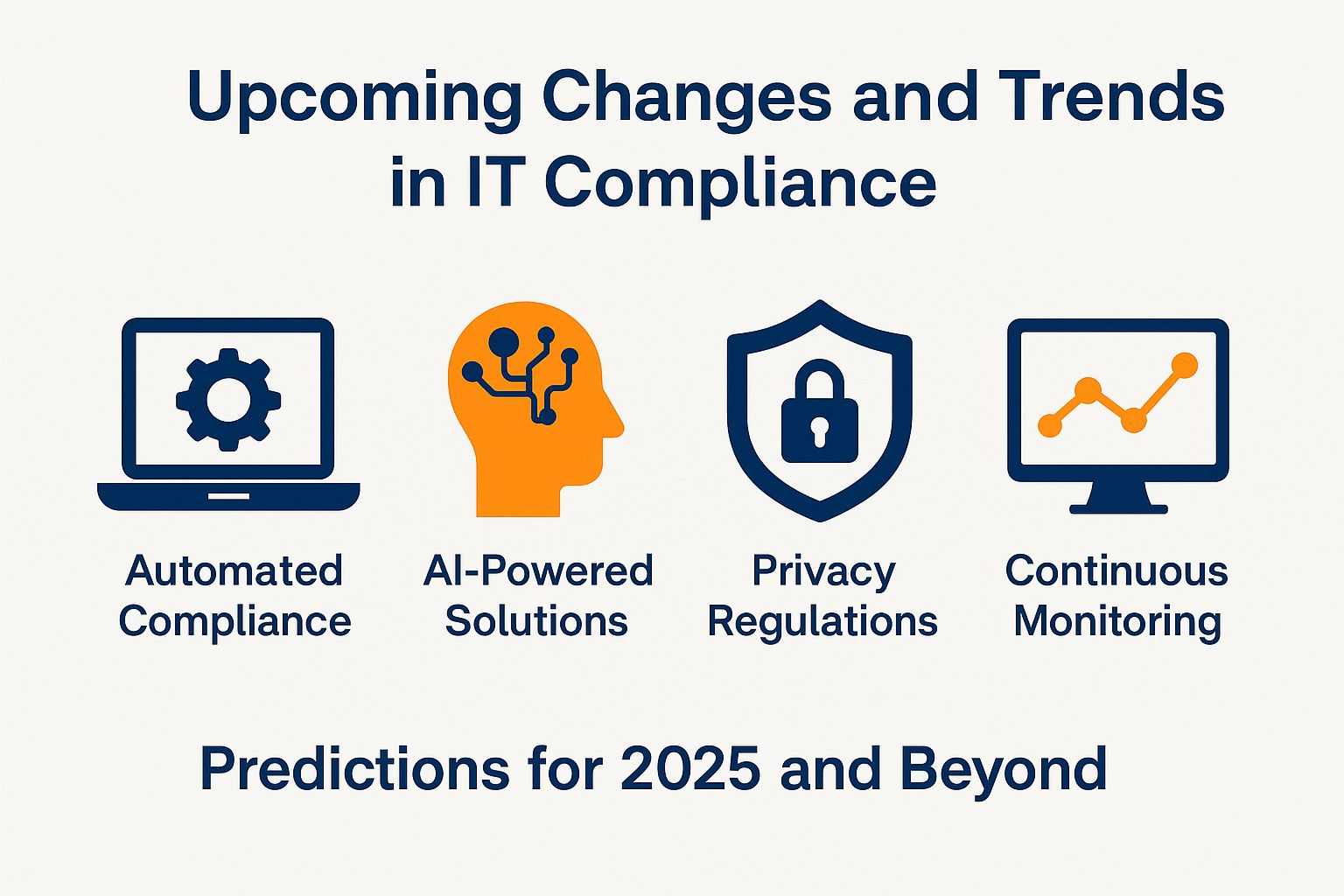
Predictions for 2025 and Beyond
Predictions for IT compliance in 2025 and beyond suggest a notable shift towards more stringent regulations and enhanced cybersecurity measures, prompting organizations to invest in advanced compliance management systems, compliance software solutions, and compliance tools.
This landscape highlights the importance of data governance. Businesses must manage sensitive information properly to maintain trust and compliance. Furthermore, robust incident management protocols, compliance initiatives, and audits will be essential. Organizations must respond quickly to breaches to minimize damage.
As third-party risks continue to escalate, organizations will also be responsible for diligent oversight of their vendor relationships, critically assessing the compliance measures of these external partners, third-party compliance, and business risk assessment to ensure alignment with changing regulatory requirements.
These factors will force organizations to reevaluate compliance strategies. They must foster a culture of preparedness that prioritizes proactive risk management and long-term sustainability.
Frequently Asked Questions
What is IT compliance and why is it important for regulated industries to know in 2025?
IT compliance refers to adhering to laws, regulations, and industry standards related to the use, storage, and protection of digital information. Regulated industries must stay updated on IT compliance in 2025. This helps avoid penalties, maintain customer trust, remain competitive, and ensure business continuity.
Which industries are considered regulated and need to be aware of IT compliance in 2025?
Regulated industries include healthcare, finance, government, education, aviation compliance, manufacturing compliance, and others that handle sensitive information and must comply with strict regulations and standards. These industries must stay updated on IT compliance in 2025 to ensure they are meeting all necessary requirements.
What are some common regulations and standards that regulated industries must comply with in 2025?
Some common regulations and standards related to IT compliance include HIPAA, GDPR, PCI DSS, ISO 27001, NIST Cybersecurity Framework, and regulatory frameworks. These regulations and standards outline specific requirements for protecting data and maintaining compliance in various industries.
How can regulated industries stay compliant with IT regulations and standards in 2025?
Regulated industries can stay compliant by reviewing and updating policies regularly. They should conduct annual risk assessments, implement secure systems, and provide ongoing compliance training for employees.
What are the consequences of non-compliance with IT regulations in 2025?
Non-compliance with IT regulations in 2025 can result in severe consequences such as fines, lawsuits, damage to reputation, loss of customers, legal action, and enforcement actions. It is crucial for regulated industries to prioritize compliance to avoid these consequences and maintain their business operations.
How can companies prepare for upcoming changes in IT compliance regulations in 2025?
Companies can prepare for IT compliance changes in 2025 by staying informed about industry trends. They should attend conferences, network with professionals, and partner with compliance experts.

